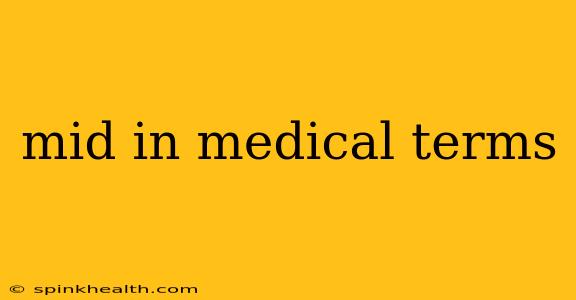Mid: Decoding the Medical Meaning of a Simple Word
The word "mid," seemingly straightforward in everyday conversation, takes on nuanced meanings within the medical field. It's not a standalone term but rather a prefix or part of compound words, often indicating a position, timing, or relationship. Understanding its context is crucial for accurate interpretation. Let's unravel the mystery behind "mid" in medical terminology, exploring its various uses and uncovering its hidden depths.
What does "mid" mean in medical terms?
In the medical context, "mid" typically signifies something occurring in the middle or center. It might refer to a location, a time point, or a stage within a process. For example, "mid-shaft fracture" clearly indicates a break in the middle of a long bone, while "mid-systolic click" points to a heart sound occurring during the middle of the heart's contraction. The meaning depends entirely on the word it modifies. It's rarely used independently.
What are some examples of "mid" used in medical terms?
Let's delve into some specific examples to clarify the usage of "mid" in medical terminology:
-
Mid-abdominal pain: Pain located in the middle of the abdomen. This could indicate various issues depending on other symptoms.
-
Mid-diastolic murmur: A heart murmur heard during the middle of the heart's relaxation phase (diastole). This often points towards specific valvular issues.
-
Mid-systolic click: As mentioned earlier, a clicking sound heard during the middle of the heart's contraction. A common finding in mitral valve prolapse.
-
Midline: This term indicates the imaginary line running down the center of the body, from the head to the feet. It's crucial in surgical procedures and anatomical descriptions.
-
Mid-pregnancy: This simply refers to the middle stage of pregnancy, usually around the 4th or 5th month.
How is "mid" used differently than "medial"?
While both "mid" and "medial" relate to the middle, they have distinct applications. "Medial" specifically refers to a structure's position relative to the midline of the body. Something medial is closer to the midline. "Mid," on the other hand, indicates a position in the center of a specific structure or process, without necessarily relating it to the body's midline. For instance, a mid-shaft fracture is in the middle of the bone, regardless of where that bone is located on the body.
Can "mid" be used to describe the middle of a process or event?
Absolutely! "Mid" can indeed describe the temporal middle of a process. "Mid-pregnancy," as previously mentioned, is a prime example. Other examples might include "mid-stage of a disease" or "mid-course correction in a treatment plan." This usage implies being halfway through a duration, timeline, or progression.
What are some medical conditions that might include "mid" in their description?
Many conditions don't explicitly have "mid" in their name, but the term might appear in their description or associated symptoms. For example, a patient might present with mid-epigastric pain (pain in the middle of the upper abdomen), which could potentially be linked to various gastrointestinal issues or heartburn. The term provides a key localization point for clinicians.
In conclusion, while "mid" itself isn't a complex term, its usage within medical terminology requires careful consideration of the surrounding words. Its meaning is entirely context-dependent, providing vital information regarding location, timing, or stage. Understanding this nuance is essential for interpreting medical reports and discussions accurately. Always refer to a medical professional for any health concerns.

